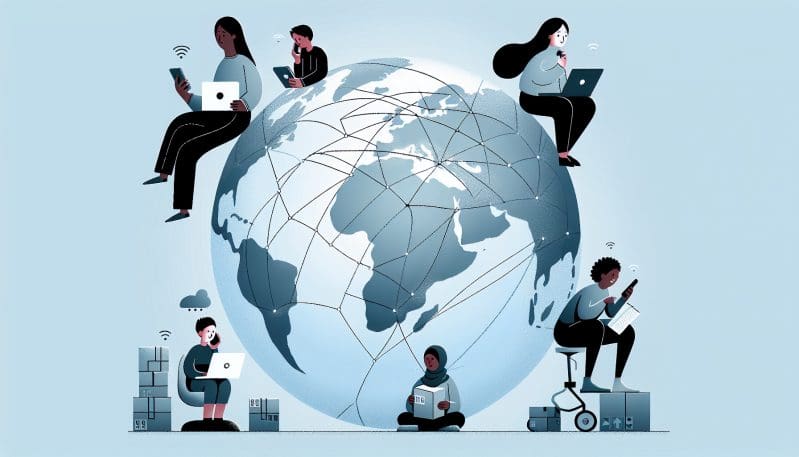Bridging the Global Divide: The Future of International Networking in a Gig Economy
- Home
- Bridging the Global Divide: The Future of International Networking in a Gig Economy

- Editors Desk
- February 12, 2024
- 0 Comments
As we commemorate International Networking Week at ‘No Worker Left Behind’, our reflections on the workforce landscape naturally extend to the horizon of the gig economy—a horizon that expands across borders and cultures. This economy, defined by freelance, project-based, and remote work, has revolutionized the concept of ‘work’ itself, presenting a unique blend of challenges and opportunities for the global workforce.
In this rapidly evolving job market, international networking becomes a weaving thread that not only connects disparate workers but also serves as a lifeline to the vast opportunities and diverse experiences the world has to offer. It is no longer just about who you know but how effectively you can collaborate across the digital divide.
### The Role of Technology in Cross-Border Collaborations
Technology plays the pivotal role in this transformation. Platforms such as LinkedIn, Upwork, and various professional forums have democratized networking, allowing individuals from every corner of the globe to connect, engage and collaborate on projects. This has led to a surge in cross-border collaborations, where individuals combine their diverse skill sets to create unparalleled value.
Yet, this digital frontier is not without its challenges. Time zones, language barriers, and cultural differences often complicate international interactions. Moreover, access to reliable internet and digital tools remains a luxury in many parts of the world, inadvertently sidelining talented individuals. As a society, we must address these disparities to ensure a level playing field for all.
### Strategies for Global Networking in a Gig Economy
Building a global network in a gig economy requires strategic finesse. The key is to establish a strong personal brand, showcase your skillset, and be proactive in community participation. This includes engaging in online forums, attending virtual conferences, and contributing to collaborative projects across borders.
Yet, networking is more than just a series of transactions; it’s about forming lasting, meaningful connections. This requires going beyond the initial interaction and nurturing these relationships through regular check-ins, collaborative endeavors, and mutual support.
### Impact of International Networking on Career Development and Economic Growth
The benefits of a well-curated international network are manifold. For individuals, it opens doors to global opportunities, fosters cultural understanding, and enhances career resilience in a volatile job market. For economies, it spurs innovation, facilitates the exchange of ideas, and promotes economic growth through diverse, collaborative inputs.
Despite the opportunities, we cannot overlook the fact that not all workers are positioned equally to take advantage of this shift. The digital divide is real, and it threatens to widen the gap between the ‘networked’ and the ‘networkless.’
### Inclusivity and Equity in International Networking
So how do we ensure inclusivity and equity in international networking? First, by pushing for universal access to digital infrastructure. We must also provide educational resources that equip workers with the skills required to thrive in a digital environment. Lastly, we need to foster a culture of inclusivity that values diverse perspectives and combats bias, ensuring that every connection made contributes to a more cohesive global network.
### The Way Forward
The future of work is unquestionably intertwined with the gig economy and international networking. As we navigate these changes, our commitment at ‘No Worker Left Behind’ is unwavering. We are dedicated to empowering workers worldwide by advocating for policies that support equitable access to networking opportunities, researching trends that shape the future of work, and creating platforms that bring the global workforce together.
In the spirit of International Networking Week, let us pledge to build bridges—not barriers—in our pursuit of a more connected and inclusive world. Let us commit to ensuring that no worker, regardless of their geographic or socioeconomic status, is left behind.
Join us in this thought-provoking journey, share your insights, and together, let’s shape a future where international networking serves as a catalyst for unity, growth, and shared prosperity in the gig economy.
Choose Layout
Main Color Scheme
- RTL Version
- LTR Version
